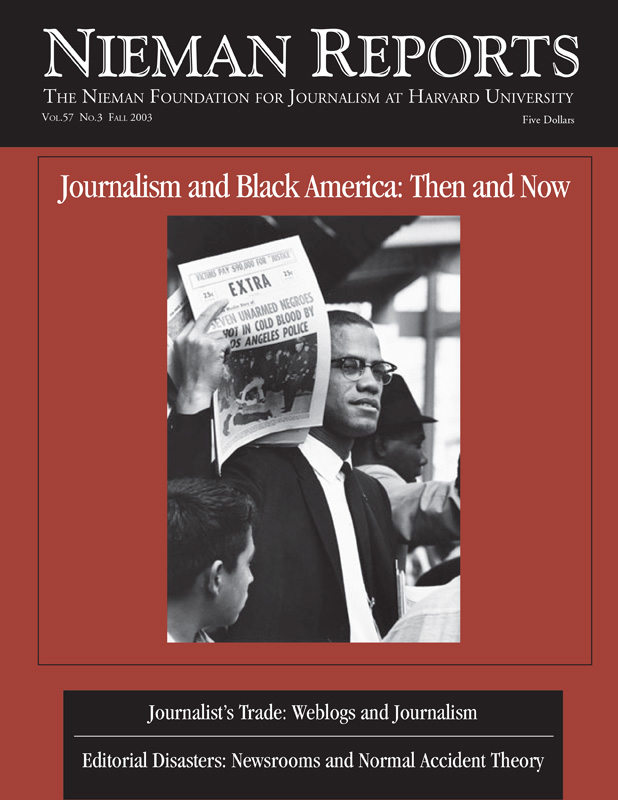
1950’s era car in Trinidad, Cuba. Photo by Christina Andujar.
As you roll through the streets of Havana, past red-scarved school children, 1950’s era cars, pockmarked buildings, a blue harbor framed by the Malecon, your mind wanders to this puzzle: What is missing from Cuba?
Airplanes, for one thing. The skies are virtually empty. Boats are all but missing, too; Cubans need a special license to fish off shore. Cell phones; they are missing, though not missed by visitors from the United States. And Fidel Castro is missing, too; you rarely see his image, but his presence is always felt.
A group of Nieman Fellows and friends of the program traveled to the Communist island in late May and found a country on the verge of change. Changing to what? It is hard to say. And when? We’ve been waiting for Cuba to change for more than four decades.
Our visit took us first to Havana for four days and then to Cienfuegos and Trinidad, two small cities on the southern side of the island. Beforehand, several of us spent two days in Miami, where we learned from members of the exile community how they view the place that remains the primary obsession for many in south Florida’s political community.
That there are no boats in the harbor, or few planes in the sky, is testament to Castro’s hold on the country. Look at the people and you see a resignation, a sullenness, especially in Havana, where families are packed into once-beautiful apartment buildings. During the day, many people mill about, with little to do; at night, the bars and nightclubs that cater to tourists explode with Son music.
For several years now, Castro has attempted to calibrate a dicey equation: Money from tourism and some foreign investment is meant to replace the loss of billions in Soviet aid after the fall of the USSR. But the influx of dollars brings an inevitable inequality, and with it comes a taste of freedoms that have been denied since the revolution. A few weeks before our visit, Castro jailed 75 people—many of them journalists—who were fueling a nascent democratic movement.
Yet the imported freedoms—and with them, the good and bad of capitalism—still seep into the culture.
So it is that inside the Capitol, with its gold leaf ceilings, marble floors, and a rotunda that is said to be the third highest in the world, there is a room that houses a cybercafé. Does the café offer a voice for democracy, here in the old Capitol where democracy ended in 1959? It would seem so, except that Internet access costs five dollars an hour—out of reach for most people in a country where wages can be six dollars each month. And for those who can afford to use the Internet, the traffic is monitored by the government.
Another contrast emerges when we visit privately run restaurants called paladars. Hidden away in simple homes, they are known by many of the locals, tolerated by the government, but afforded only by tourists with dollars. We ate red snapper and lobster and smoked cigars in one unlicensed paladar that was run by a one-time engineer and lawyer. Risk-takers, they live with a wink, a fiction, and perhaps a few bribes.
Consider this conversation:
“Aren’t shellfish illegal here in Cuba?,” we asked after eating a delicious lobster meal.
“That wasn’t lobster,” came the reply. “It was eggs with shells.”
At another stop in Havana, an artist has painted an alley with reds and blues and yellows, and believers have carved Santeria gods into the walls. When we visited, a band entertained a sweaty crowd of a couple hundred people jammed into the alley. When one of us brought out lollypops for children, she was immediately surrounded.
The people we spoke to at these stops were friendly, yet guarded, and frequently spoke from the same script. They insist they are friends with the Americans. It’s just the U.S. government, and the embargo, they oppose.
It is easy to imagine this place when Castro and his brother die and the United States and other industrialized nations stampede in, renovate the buildings that have stood since the 1500’s, bring back the casinos, stick a Starbucks on every corner, and load the airwaves with cell phones and commercial TV. Cuba will be cleaner, and wealthier, and its people free, but it will be far less insular than it was when we visited in 2003.

School children in Cienfuegos, Cuba.

A home in Trinidad, Cuba.

An art school in Cienfuegos, Cuba.
David Dahl, a 2003 Nieman Fellow, is political editor of The Boston Globe.


